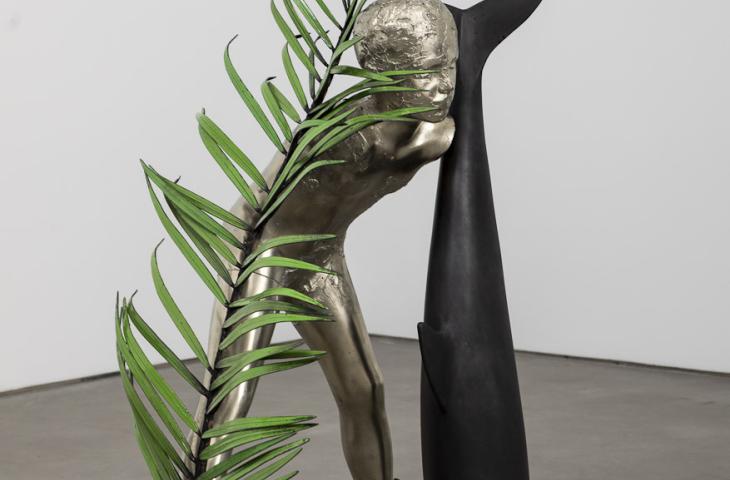Andro Wekua : Stranger in Paradise
27/10/2023 − 18/2/2024

Totally in keeping with his style of presenting works in a pared-down staging as if in a place located somewhere between memory, dreams, fantasy, longing or science-fiction-like shudder, Andro Wekua expresses here, on a large bare stage, the full gamut of melancholic and imaginative dimensions he evokes and depicts with his creations.
The few, carefully chosen images allude to a place on the Black Sea coast: architecture adorned with nostalgic neon lights, a mysterious androgynous figure related to that of a dolphin and marine flora, and a schematic seabed relief on the floor reflecting sunlight on rippling waves.
Andro Wekua, born in Sukhumi in 1977, is among the leading international artists who address identity not as a matter of determinism, but as an undefined, changeable and fluid category. Biographical facts are often cited to explain the themes of uprooting and yearning for a lost home and father that are omnipresent in his work, facts that Wekua refutes and contradicts because they only partially explain the enigma of his figures and creations.
Sukhumi, his hometown, is a sub-tropical seaside resort on the shores of the Black Sea. It is situated in Abkhazia, an autonomous region of Georgia. In 1992-1993, ethnic tensions between Russian-backed Abkhaz national separatists and the Georgian authorities led to open warfare. Ever since, Abkhazia has remained a conflict zone, inaccessible to Georgian citizens. Wekua’s father, a political activist who fought against Russian interference in the conflict, was assassinated by nationalists during the fighting, after which the family fled to Tbilisi.
As a teenager, Wekua was able to travel to Switzerland thanks to a humanitarian organisation, and studied art in Dornach, near Basel. After his studies, he stayed in Switzerland for a while, living in Zurich where he quickly established a reputation and was soon noticed both in Switzerland and internationally. After a few short stays abroad, including in New York, he moved to Berlin in 2006, where he still lives and works, one of the most well-known artists on Berlin’s international art scene and one of the most renowned of the Georgian diaspora.
Wekua’s exhibitions often feature vague, non-linear narratives that provoke ideas about the peculiarity of memory in paintings, sculpture, mixed-media installations, films and even architectural models. He transforms collages of family photographs over shots of Sukhumi – the abandoned Soviet seaside resort where neither advertisements or symbols of consumerism were allowed – into menacing paintings, drawings or magazine layouts in which he often refers to mainstream pop culture. The suspension of a narrative and the juxtaposition of different temporal registers where he creates a dialogue between very different artworks in an exhibition, highlight how memories influence and transform our dreams and how elusive the past is.
Wekua’s work sketches scenes charged with psychological and physical intensity in which words and images drift in and out of consciousness. His installations often feature sculptures resembling shopwindow mannequins but cast in wax from living models and reproduced in silicone to look both lifelike, artificial and schematic at the same time. The figures are presented in highly theatrical poses and architectural tableaux vivants, in dialogue with other elements such as collages and paintings. In this way, Wekua questions internalisation and extroversion, interior and exterior, private and public space, the performative and inhibited, and seeks to create an ambiguity and uneasiness that stimulates the viewer’s imagination.
However, in his recurrent harking back to the elusive Sukhumi, he remains vague and never depicts the dramatic events that took place there. He refutes and rejects any autobiographical interpretation that wants to see his work as a kind of pictorial illustration for trauma. However, there are some recurring and recognisable elements, such as the inaccessibility of his birthplace and homeland, the loss of a father, and the diaspora as a formidable source of permanent but unquenchable longing. This short and long memory, the unconscious and subconscious dimensions of the psyche are fertile ground for Wekua, a layer for the linguistic and the rational, from which he constructs his images from bits and pieces.
This is most evident in the architectural details he often reconstructs from memory rather than from photographs. With the human figures, and also dolphins and aquatic flora, their schematic appearance is the transformation of a realistic image to a personal representation, which can be both menacing and idyllic. For the latter, he draws on fables and fairy stories, often inspired by the pop aesthetic of Japanese manga and animation, such as Studio Ghibli’s Princess Mononoke.
Once a work is finished, Wekua says he detaches from it completely. “As soon as my work is exhibited somewhere, the intimate relationship ceases. The work is not an ambassador of my ideas; it becomes and exists completely autonomously. When I see my work in an exhibition, I am as much a spectator as you are. If a work is unable to lead a life of its own, it does not leave the studio.” The titles of his works and exhibitions are similarly enigmatic and generic, with no reference to the artist’s biography. Nevertheless, there is no escaping the fact that every detail, colour and line deals, even indirectly, with the loss of family, war, displacement, culture shock and loneliness. His affirmed disinterest in his protagonists, his distaste for the autobiographical and his marked detachment from his creations could be interpreted as self-protection, but it seems just as likely that Wekua does not want his work to be defined by the circumstances and events of his life.
Curator: Dirk Snauwaert
Text: Dirk Snauwaert
